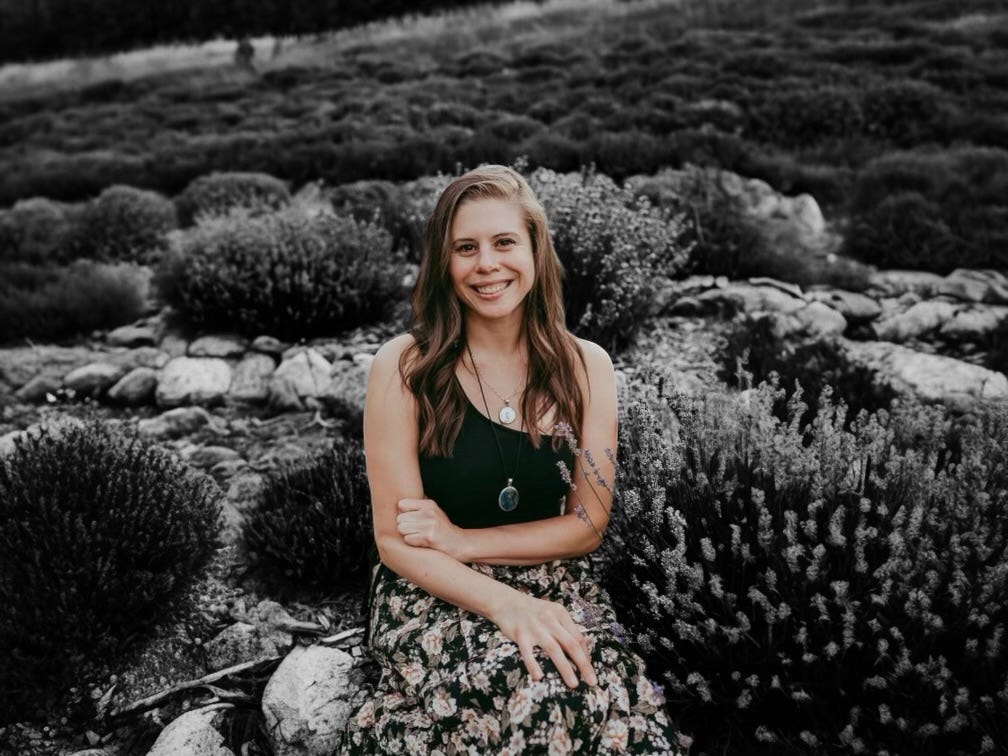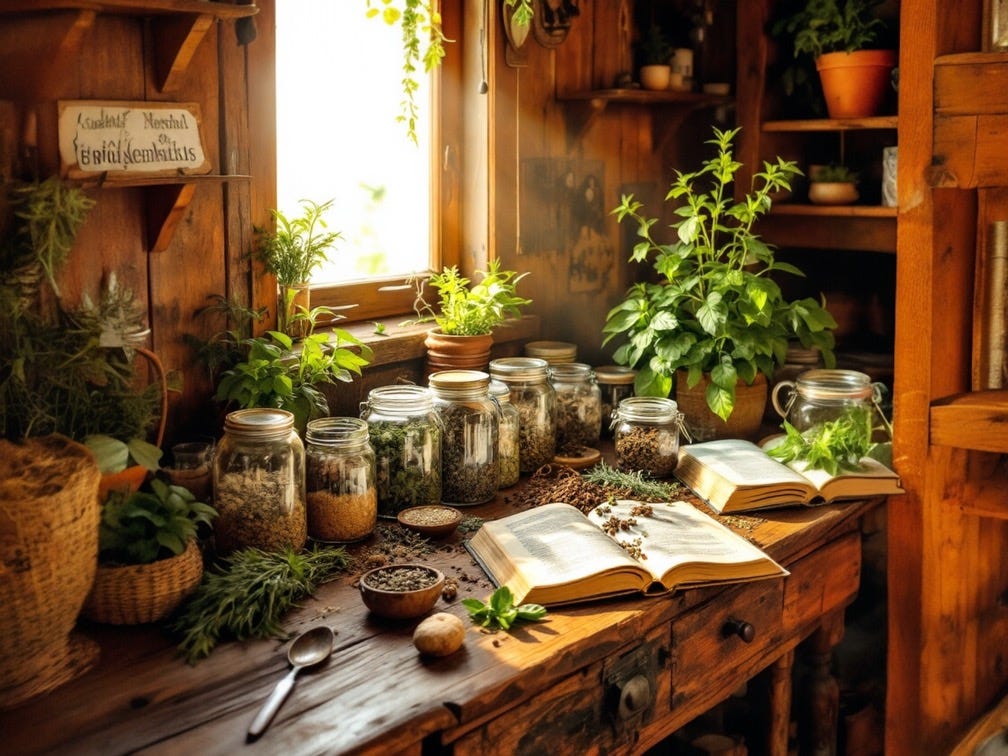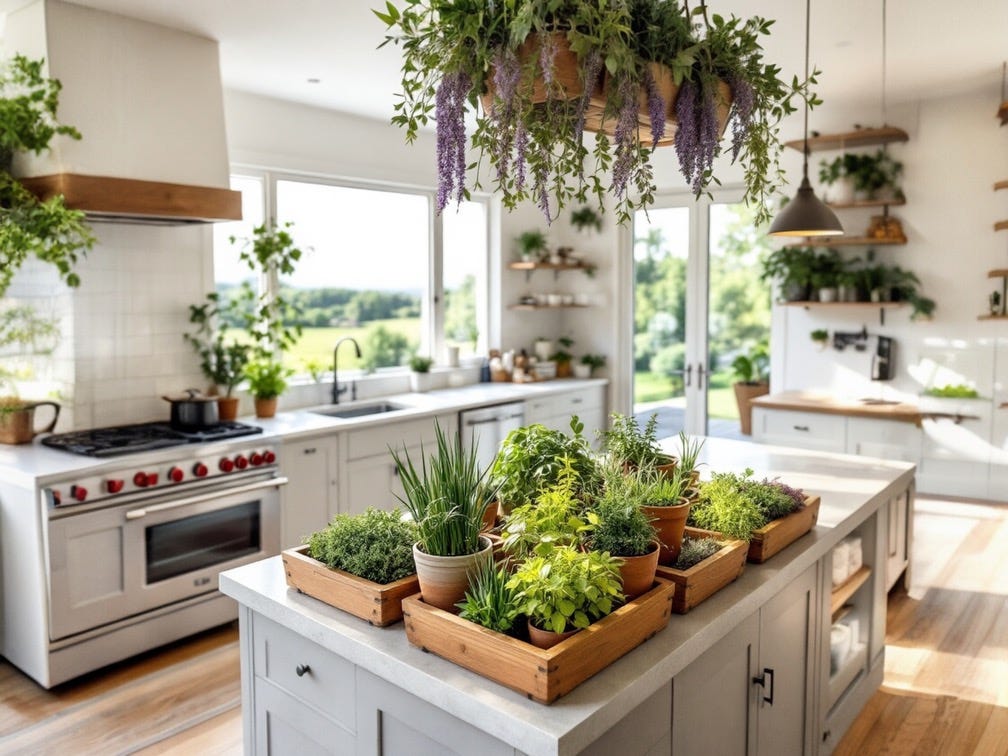The Healing Wisdom of Brita LaTona
Where Herbalism, Intuition, and Nature’s Medicine Collide
Nestled in the heart of Northern Colorado, Brita LaTona is more than just a Clinical Herbalist—she is a bridge between ancient plant wisdom and modern holistic wellness.
With a deep passion for Intuitive Plant Healing, Ecotherapy, and Nature-Connection practices, Brita’s work at Golden Poppy Herbal Apothecary (Fort Collins, Colorado) is transforming the way people engage with their own healing.
Brita’s journey from cultural anthropology to herbal medicine is a testament to the deep interconnection between land, plants, and personal well-being.
A Path Rooted in Curiosity and Healing
Brita’s introduction to herbal medicine wasn’t through textbooks or a clinical setting. Instead, it was sparked by her fascination with land-based cultures and their traditional uses of plant medicine.
“I was originally drawn to herbal medicine because I was really interested in cultural anthropology—how different cultures across the world have worked with plants for healing,” she recalls.
However, it wasn’t just academic curiosity that drove her deeper into the world of herbs.
“I had always struggled with my own anxiety and stress and wanted to look for alternative treatments rather than immediately turning to medication.”
This personal search for balance led her to study Herbal Medicine and Nutrition at the North American Institute of Medical Herbalism in Boulder (now the Colorado School of Clinical Herbalism).
She later completed a Professional Herbalist certification at the East West School of Planetary Herbology in Santa Cruz, California, and, in 2020, an Ecotherapy Level 1 Certification from the Earthbody Institute.
Since then, Brita has devoted her career to helping others navigate their own wellness journeys, using a holistic approach that weaves together clinical herbalism, intuitive plant healing, and the restorative power of nature.
Nature as Medicine: The Power of Ecotherapy
In a world increasingly disconnected from the natural rhythms of the earth, Brita’s work in Ecotherapy serves as a vital reminder of the healing power of the outdoors.
“Ecotherapy is really about immersing yourself in nature—because by reconnecting with nature, we reconnect with our essential selves,” she explains.
One of her most profound personal experiences with Ecotherapy came during a period of deep grief. Instead of retreating inward, she turned to the natural world for solace. “I made it a practice to go to the river for seven days,” she says.
“What that experience brought me was this profound release, this feeling that I didn’t have to be afraid of grief in the same way because the element of water was holding it.”
For Brita, even simple daily nature practices—such as grounding exercises, sitting quietly with a tree, or listening to birdsong—can help recalibrate the nervous system and restore inner peace.
“Even just ten minutes outside, or putting your feet on the earth, can have a profound impact on your well-being.”
Beyond Teas and Tinctures: The Art of Intuitive Plant Healing
While many people are familiar with using herbal teas and tinctures for digestion, sleep, or immunity, Brita’s work delves deeper into the intuitive and energetic relationship between plants and people. “Plants have a nervous system very similar to ours,” she notes. “When we sit in their presence, there’s actually an exchange of information happening between our nervous systems.”
To help people cultivate this connection, she teaches a technique called Deep Noticing. “It’s about sitting quietly with a plant and tuning into what it’s communicating,” she explains.
“It’s a way of developing an intuitive relationship with the plant world directly, without needing a book or an expert to tell you what a plant does.”
She often guides clients through plant meditations, inviting them to discover their own “plant ally.” This is a plant that presents itself—whether through dreams, intuition, or repeated encounters in nature—and offers personal healing wisdom.
“Once you find your plant ally, you can start working with it—whether through tea, tincture, or simply being in its presence.”
This approach aligns with indigenous traditions of plant spirit medicine, in which plants are viewed not just as physical remedies but as sentient beings that offer guidance, healing, and wisdom.
Herbal Allies for Emotional Resilience
Given the increasing rates of anxiety, stress, and burnout in today’s world, Brita specializes in supporting the nervous system with herbal allies that bring balance and calm.
“There are two key classes of herbs I work with: adaptogens and nervines,” she explains:
Adaptogens like ashwagandha, holy basil, and reishi mushrooms help the body adapt to stress by regulating cortisol and adrenaline levels.
Nervines like lemon balm, milky oats, passionflower, and skullcap help soothe the nervous system, making them especially useful for anxiety, tension, and sleep issues.
She also encourages clients to incorporate herbal self-care rituals into their daily lives—whether it’s a cup of lemon balm tea in the evening, a lavender and salt bath, or an aromatherapy blend to diffuse in stressful moments.
“Small, consistent practices create the biggest impact over time,” she notes.
Rewilding Ourselves: Healing Through Immersion in Nature
Beyond individual herbal remedies, Brita’s work emphasizes the broader concept of rewilding—immersing oneself in nature to reconnect with an intuitive, primal sense of well-being.
“Rewilding is the idea that by being in nature and connecting to its cycles, we reconnect with our most essential selves,” she explains.
Through immersive Wild Plant Medicine Workshops in the Rocky Mountains, she helps people directly experience the magic of wild plants—learning to identify, harvest, and prepare their own herbal medicine in a way that deepens their personal connection to the land.
“Something shifts when you’re out in nature, touching the plants, smelling the soil—it's a remembering,” she says. “A remembering of something ancient and instinctive within us.”
For Brita, rewilding isn’t just about spending time outdoors; it’s about restoring a relationship that has been severed by modern life.
“We are nature,” she emphasizes. “We aren’t separate from it. And when we remember that, deep healing happens.”
Shifting Perspectives: Herbalism as Preventative Medicine
Despite the growing popularity of herbal medicine, Brita still encounters common misconceptions—particularly the idea that herbs are weak compared to pharmaceuticals.
“Some people think herbs aren’t powerful, but the reality is they can interact with pharmaceutical medications,” she says. “We’re not talking about just drinking a Celestial Seasonings tea. When you use medicinal doses, herbs have profound effects.”
She also stresses that herbalism is a preventative approach to wellness, rather than a quick fix. “It’s about long-term, sustainable self-care—doing the small things consistently to prevent deeper imbalances from manifesting.”
For many of her clients, the hardest part isn’t learning about herbal medicine but sticking with it. “Consistency is key. It’s easy to take a supplement for a week, but the real magic happens when you integrate these practices into your daily life.”
A Vision for the Future of Herbal Medicine
Looking ahead, Brita is hopeful about the future of herbal medicine. Over the past decade, she’s seen a shift from herbalism being considered “fringe” to becoming more mainstream.
“People are coming in already pretty educated now,” she observes. “Thanks to podcasts, YouTube, and the accessibility of information, more and more people are exploring natural modalities.”
With increasing awareness around mental health, self-care, and holistic well-being, Brita sees herbalism as a powerful tool for personal and collective healing.
“Herbs help us reconnect—with ourselves, with the land, and with each other,” she reflects. “And in a world that often feels disconnected, that’s more important than ever.”
Through her work at Golden Poppy Herbal Apothecary, Brita LaTona is doing more than just dispensing herbal remedies—she’s helping people rediscover an ancient truth: that healing is all around us, waiting in the roots, leaves, and flowers of the natural world.
All we have to do is listen.







Brita LaTona’s story and mission are awe-inspiring—it embodies a profound connection between personal well-being and the natural world. Her fusion of herbal medicine, Ecotherapy, and intuitive plant healing creates a holistic approach that speaks to both scientific knowledge and ancient wisdom.
I’m struck by how Brita brings together practical techniques, like adaptogens and nervines, alongside deeper, intuitive practices, such as plant meditations and discovering “plant allies.” It feels like an invitation not just to heal, but to reconnect with a sense of wonder and kinship with nature. Her emphasis on rewilding, through Wild Plant Medicine Workshops, takes this further—helping individuals rediscover their roots and integrate nature into their lives.
Wow. Her work sounds amazing.